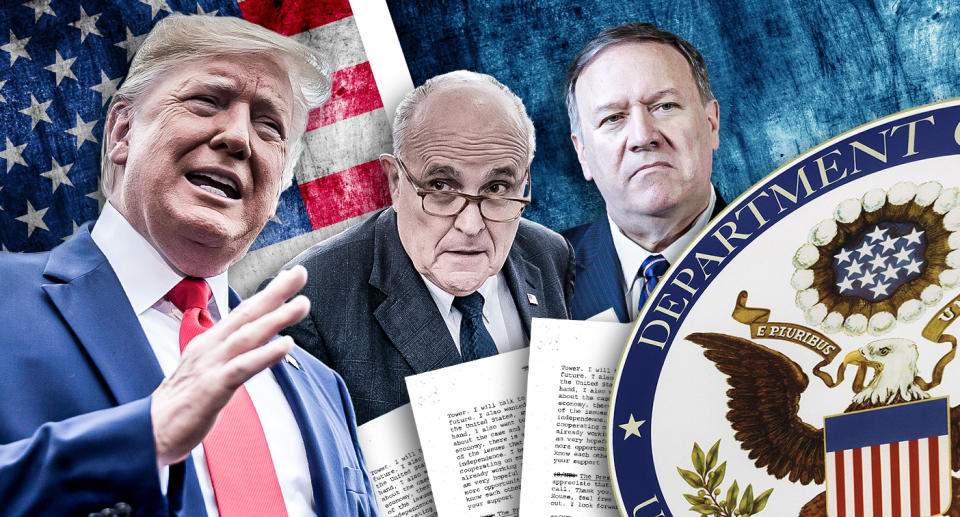State Dept. ordered to turn over Ukraine documents
WASHINGTON — In what could prove a highly consequential ruling, a federal judge has ordered the Trump administration to start turning over documents regarding potentially improper White House influence on diplomacy in Ukraine.
The decision, part of a lawsuit filed under the Freedom of Information Act, represents the first judicial order mandating that the Trump administration comply with a request for communications between diplomats, White House officials and outside power brokers like Rudy Giuliani, the president’s personal lawyer. Secretary of State Mike Pompeo was included in the original request, as were a number of his top deputies, indicating a widespread belief among Trump’s detractors that American foreign policy has been hijacked by political operatives — and political considerations.
The documents were being requested by American Oversight, a progressive watchdog group in Washington, D.C. The group filed a Freedom of Information Act request when it noticed news reports that the U.S. ambassador to Ukraine, Marie Yovanovitch, had been recalled. American Oversight filed a lawsuit in October, after the State Department failed to turn over the documents.
Speaking to Yahoo News after Wednesday’s decision, American Oversight executive director Austin Evers called the ruling “a crack in the administration’s stone wall.”
The Trump administration will now have 30 days to start turning over records and documents relating to the Ukraine affair, and though it could find legal pretext for refusing to do so, Wednesday’s ruling did appear to be a vindication of months-long efforts for American Oversight.
In a separate statement, Evers called the ruling a “major setback” for Trump. On background, staffers for American Oversight agreed with the assessment that the order left little room for the Trump administration to maneuver.
Neither the State Department nor the Department of Justice replied to a request for comment.

Joshua Geltzer, a constitutional law scholar at Georgetown University, told Yahoo News that the directive was “a big deal in its significance but also appears to reflect a clear application of settled law,” since Freedom of Information requests “aren’t supposed to be handled so slowly as to make them irrelevant.” Geltzer, who served on the National Security Council during the Obama administration, added that “whatever weird role President Trump assigned to Rudy Giuliani, he’s not a government employee — so it’s really hard for the government to claim that the communications with him are subject to various privileges.”
At the time that Yovanovitch was suddenly recalled, Giuliani and others — including Gordon Sondland, U.S. ambassador to the European Union — were attempting to pressure Ukraine’s new president, Volodymyr Zelensky, to launch an investigation into the business affairs of Hunter Biden, son of Trump’s potential 2020 rival Joe Biden. The younger Biden sat on the board of Burisma, a Ukrainian energy company accused of corrupt practices. He no longer has ties to Burisma, but Trump and his allies have resurrected questions about his involvement.
Trump’s attempts to exert pressure on Zelensky became public when an anonymous whistleblower complaint became public in late September. That complaint, which strongly indicates that Trump attempted to enter into an improper quid pro quo arrangement with Zelensky, has served as the basis of an impeachment inquiry launched by congressional Democrats.
Impeachment investigators have made document demands of their own. Those are separate from the earlier request made by American Oversight under the Freedom of Information Act.
In a hearing before Christopher Cooper of the D.C. District Court, an attorney for American Oversight argued that “public interest weighs heavily in favor of disclosure.” He noted that since Giuliani — who was central to running what the top U.S. envoy in Ukraine has called an “informal” diplomatic outfit in Kiev — is Trump’s personal lawyer and has “no official government position,” there is no reason to shield his correspondences from public view.

A main target of the request appears to be Pompeo, whose involvement in the Ukraine pressure campaign remains unclear. Many career staffers at State are reportedly furious that he allowed Yovanovitch to be stripped of her position without defending her. More broadly, the diplomatic corps regards his unflagging loyalty to Trump with great skepticism.
Judge Cooper said that while he was “generally skeptical” of speeding up Freedom of Information Act requests by applying judicial pressure, the American Oversight request involved “documents and records of critical importance.” He then said the State Department had 30 days to comply with the document request. A written version of that order is forthcoming.
At one point, Cooper alluded to the thousands of documents the State Department was forced to produce when Republicans launched an investigation into the 2012 attack on the U.S. Consulate in Benghazi, Libya, in which four Americans were killed. That investigation was widely seen as an attempt to damage Hillary Clinton, then the secretary of state.
Among the legislators leading that inquiry was a conservative congressman from Kansas, Mike Pompeo. Like many Republicans at the time, he seized on the revelation — made in the course of the Benghazi inquest — that Clinton used a private email server, in circumvention of government procedure.
Speaking in 2016, Pompeo said the arrangement had been “intentionally designed to circumvent the normal process.” Three years later, Pompeo and the president he serves stand similarly accused.
_____
Download the Yahoo News app to customize your experience.
Read more from Yahoo News:



